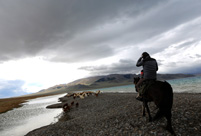 Not afraid of death
Not afraid of death
 Chen Guangbiao ads on A15 of NYT to host charity luncheon for 1,000 poor and destitute Americans
Chen Guangbiao ads on A15 of NYT to host charity luncheon for 1,000 poor and destitute Americans
 Passionate bar babies and fans feel the charm of World Cup 2014
Passionate bar babies and fans feel the charm of World Cup 2014
 US aircraft carrier docks in HK, welcomes PLA aboard
US aircraft carrier docks in HK, welcomes PLA aboard
 Graduation season: 'Take graduation photos to mark our love'
Graduation season: 'Take graduation photos to mark our love'
 College-student-turned nun becomes famous on Internet
College-student-turned nun becomes famous on Internet
 Japanese airplanes tail Chinese warplane in China's ADIZ
Japanese airplanes tail Chinese warplane in China's ADIZ
 China applies for UNESCO listing of Nanjing documents
China applies for UNESCO listing of Nanjing documents
 Picturesque scenery in Hongcun Village
Picturesque scenery in Hongcun Village
 Japan's PM vows to resume commercial whale hunt
Japan's PM vows to resume commercial whale hunt
A Chinese scholar has refuted former U.S. National Security Advisor Stephen Hadley's allegations at the World Peace Foruma here that China's diplomacy in the Asia-Pacific has escalated regional tensions.
Wu Xinbo, executive dean of Institute of International Studies with Fudan University, told the People's Daily Saturday that Hadley's allegations reflected the U.S. concerns about China's rise in the Asia-Pacific and the U.S. intention to complicate the situation in the region.
First, the U.S. overreaction to China's proposal at the Conference on Interaction and Confidence-Building Measures in Asia (CICA) shows the United States has not adapted itself to the new situation, said Wu who is also a participant in the forum.
Through the CICA, China wants to tell the world that security in Asia should be determined by Asian countries and the countries are capable and wise enough to safeguard and promote security in Asia through cooperation.
In the past, the United States played a leading role in regional security in the Asia-Pacific and was used to its allies and partners' reliance on it to solve security issues, he said.
But now, Wu said, with the development of Asian economies, Asian countries have become confident and come to realize the importance of dealing with regional security by themselves. Therefore, it is logical that security in Asia should be determined by Asian countries, he said.
The scholar also said it is unnecessary for the United States to worry about its role and influence in the region as China welcomes other countries' playing a positive and constructive role in the region.
Secondly, the United States and its allies are making troubles for China, which is not China's conspiracy theory as Hadley claimed, but is the truth, Wu said.
Taking a look at the U.S. strategies in security, economy and foreign policy around China, Wu said, it is building a system with itself as the center and its allies as members.
The United States is building a security alliance, promoting the Trans-Pacific Partnership agreement and conducting U.S.-Japan-Australia and U.S.-Japan-India trilateral dialogues on how to deal with a rising China, he said.
These facts demonstrate that the United States is handling comprehensively its relations with a rising China through arrangements of counterbalancing the Asian giant. And many moves during this process are not in the interest of China, Wu said, adding that it is no wonder that Beijing felt it had been "tricked" by Washington.
If it is not true, "then will the United States tell China what it discussed with its allies in bilateral and trilateral dialogues, what role China has played in their dialogues and who they consider as a presumed enemy in the military cooperation with its allies?" Wu asked.
Thirdly, the United States is to blame if the endeavor in building a new model of major-country relations between the world's two largest economies is not processing satisfactorily, Wu said.
Hadley claimed China did not show enough sincerity and should adopt practical measures to promote the new model of major-country relationship.
Both countries should make joint efforts to build the new relations, Wu said.
"The Chinese leadership is serious about this proposal and has been considering concrete contents in the new model of China-U.S. relationship. But the United States was not enthusiastic about the proposal in the beginning," Wu said.
"In fact, the divergence at home has affected the Obama administration's dealing with the U.S.-China relations," he said.
On policies, the United States has not attached enough importance to the China-U.S. relations and did not follow the strategy of major-country relations when handling some regional and bilateral issues, Wu said.
He said Washington was in opposition to Beijing on China's maritime disputes with its neighbors while on the Internet issues, suing Chinese military officers is destructive.
Lastly, it is irrational that the United States blamed China for lack of communication before setting up an air defence identification zone (ADIZ) over the East China Sea, Wu said.
"Has the United States informed China of its military operations in the Asia-Pacific? Then why did it place such an excessive demand on China?" Wu said. "We may need to inform the United States of setting up an ADIZ near the U.S. border. But we did this near our territory and it is our legitimate right."
 Stewardesses in Brazilian soccer jerseys
Stewardesses in Brazilian soccer jerseys Puzhehei: land of idyllic beauty
Puzhehei: land of idyllic beauty Chinese navy fleet visits Cape Town, South Africa
Chinese navy fleet visits Cape Town, South Africa PLA naval cadets toss their hats at graduation ceremony
PLA naval cadets toss their hats at graduation ceremony Graduation photo ideas: reliable alumnus and happy alumna
Graduation photo ideas: reliable alumnus and happy alumna Super daddies in 2014 World Cup
Super daddies in 2014 World Cup College girls take stylish photos to help enrollment
College girls take stylish photos to help enrollment Rebuilding the silk road
Rebuilding the silk road Top 10 Chinese products scoring World Cup goal
Top 10 Chinese products scoring World Cup goal In Pictures: Female fans of World Cup
In Pictures: Female fans of World Cup China's top 10 representative architectures
China's top 10 representative architectures Photo story: A day of 'mini girl'
Photo story: A day of 'mini girl' Top 20 hottest women in the world in 2014
Top 20 hottest women in the world in 2014  Cute animals' leisure summer in zoo
Cute animals' leisure summer in zoo Exhibition of the Buddha held in Tibet
Exhibition of the Buddha held in TibetDay|Week|Month